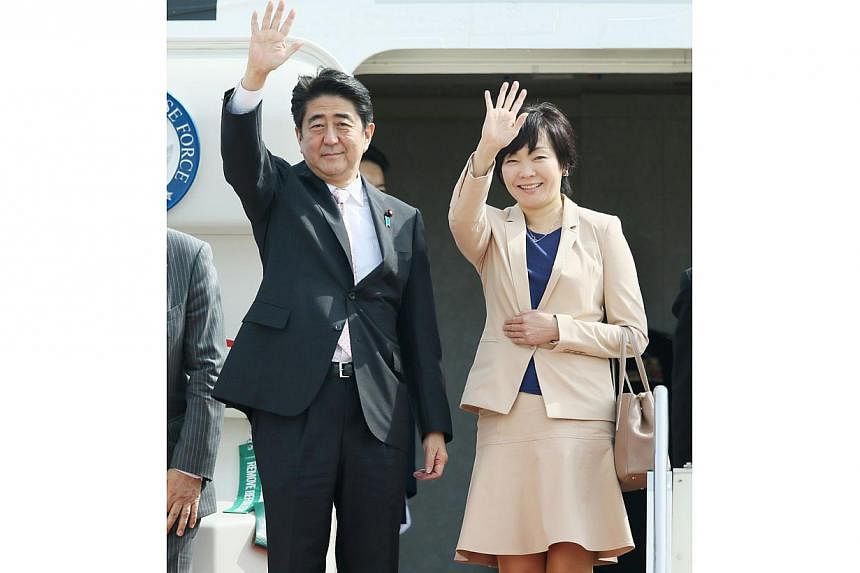SYDNEY (AFP) - Closer defence cooperation is set to take centre stage when Australia hosts Japanese Prime Minister Shinzo Abe this week, while the two allies will also shore up a burgeoning trade relationship, analysts say.
It is the first bilateral visit by a Japanese prime minister since 2002 and comes just days after Abe declared his powerful military had the right to go into battle in defence of allies, a move welcomed by Canberra but condemned by China as expansionism.
Australian Prime Minister Tony Abbott has courted Japan on security and trade matters since coming to power in September, describing their relationship as "special", as Asia adjusts to China's growing assertiveness in the region.
At the same time, Japan's long-held pacifist stance has evolved under Abe, with his country reaching out to Australia amid escalating tensions between Beijing and its neighbours over islands in the South China Sea and East China Sea.
The key US allies are tipped to announce annual leadership meetings during the July 7-10 trip, while the security theme raised in Abbott's visit to Tokyo in April will continue with the expected finalisation of a submarine deal allowing Australia to tap Japan's defence technologies.
Abe is also due to attend a meeting of the cabinet-level National Security Committee and address parliament - the first Japanese leader to do so - in a move defence analyst Hugh White described as "a very significant gesture in its own right".
"What's very striking is just how quickly Tony Abbott has moved to change the tone of the relationship with Japan," White told AFP, adding that the strengthening of security links "carries huge implications for Australia".
White added that any step Canberra took towards enhancing its security relationship with Tokyo would be seen by China as contrary to its strategic interests in the context of strained ties with Japan.
"The challenge for Australia is to avoid being pulled too much one way or the other," he said.
While defence matters look set to play a starring role, closer economic ties are also on the agenda as the two leaders rubber-stamp a long-awaited free trade deal agreed in April.
The deal gives many Australian producers and exporters an important competitive advantage, with more than 97 percent of Australia's exports to Japan receiving preferential or duty-free access.
China is Australia's largest trading partner, with two-way trade worth more than Aus$150 billion ($140 million) in 2013, while Japan is second at almost Aus$70 billion.
Joining Abe will be 25 Japanese chief executives, mirroring a similarly sized delegation of Australian business leaders that accompanied Abbott to Tokyo.
After spending Tuesday in Canberra, Abe will fly to the mining-rich Pilbara region in Western Australia and Perth, a reflection of Australia's role as a significant supplier of energy and resources to Japan.
Abe's reforms, dubbed "Abenomics", have seen Tokyo implement big government-spending policies, ease monetary policy, move towards more flexible labour markets and sign the free-trade deal with Australia.
International trade expert Alan Oxley said Australia and other countries were benefiting from Abe's push to liberalise the lacklustre Japanese economy.
"It's a very interesting trend that we are seeing in the Asia-Pacific region and it's something really quite profound," Oxley said, pointing to similar attempts by South Korea and China to open up their economies.
"When you lay the Trans-Pacific Partnership on top of that, Japan's decision to join that agreement (with Australia) was quite a game changer. It was always regarded as a stepping stone towards ... a free trade agreement among the APEC economies." The Trans-Pacific Partnership (TPP) would encompass 40 percent of the global economy and include 12 nations. Talks on setting up the pact have been delayed by intricate market access negotiations between Japan and the United States.
Abe will spend a day in New Zealand before arriving in Australia on Monday night, visiting the city of Christchurch which was flattened in a February 2011 earthquake in which 28 Japanese students died.
His trip will end in Papua New Guinea, a Pacific nation emerging as a source of fuel for Japan. It follows the first shipment of liquefied natural gas from a landmark US$19 billion project in PNG last month.

